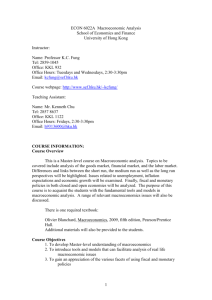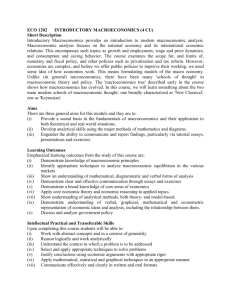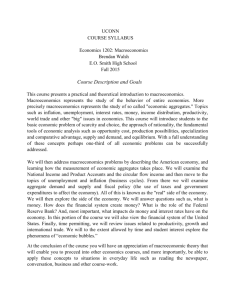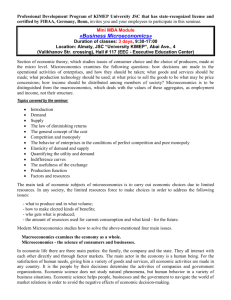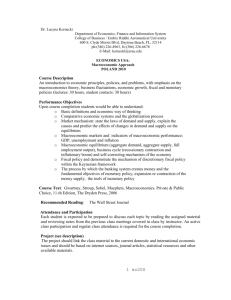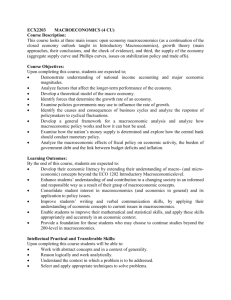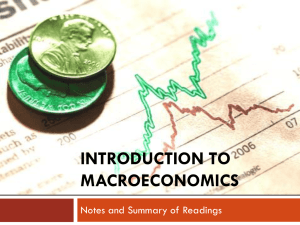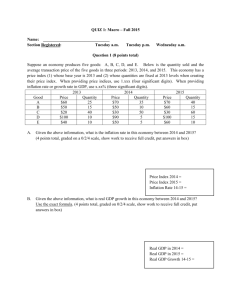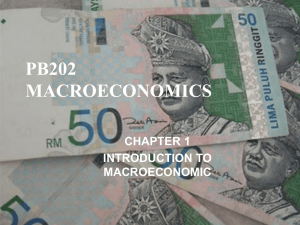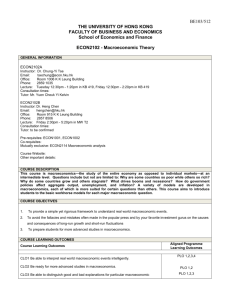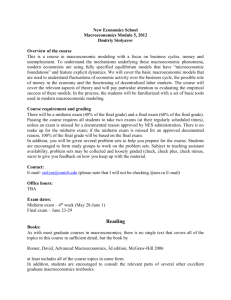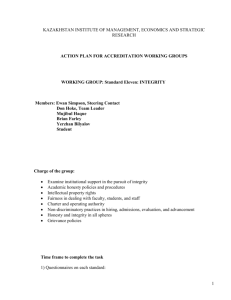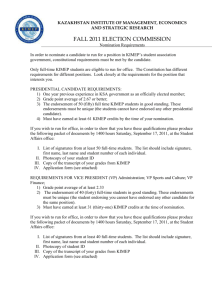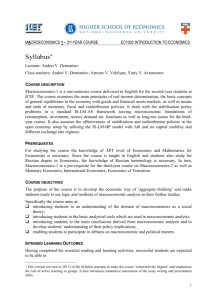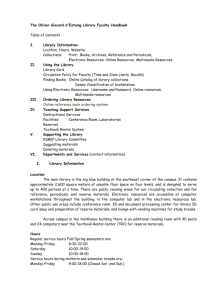Business Macroeconomics
advertisement
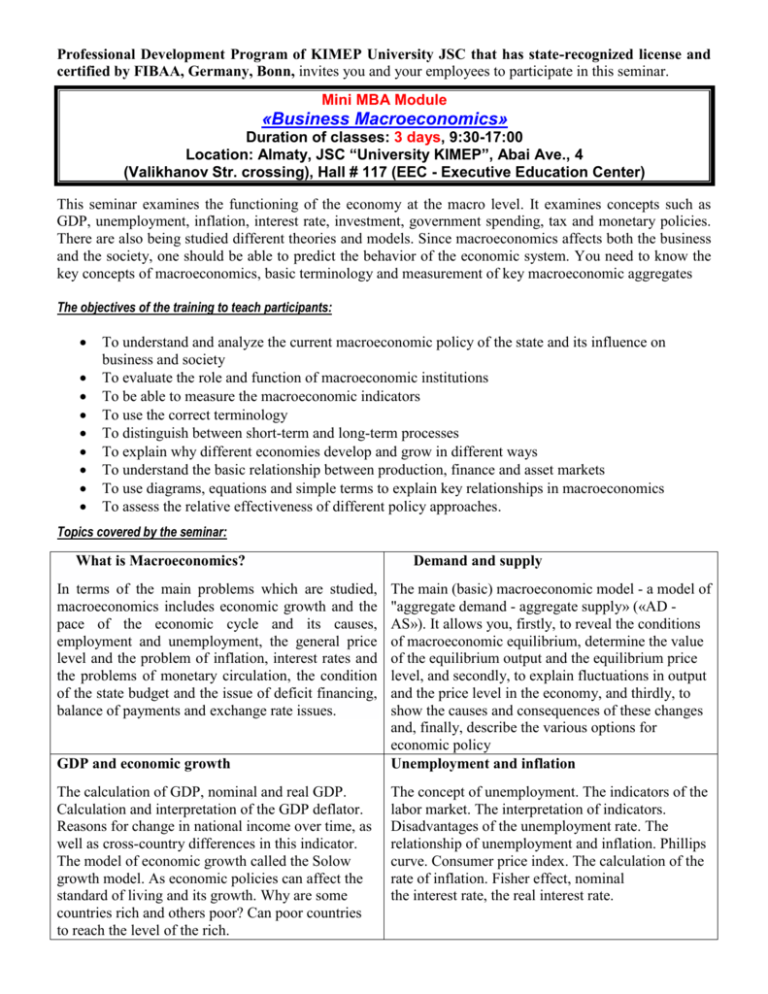
Professional Development Program of KIMEP University JSC that has state-recognized license and certified by FIBAA, Germany, Bonn, invites you and your employees to participate in this seminar. Mini MBA Module «Business Macroeconomics» Duration of classes: 3 days, 9:30-17:00 Location: Almaty, JSC “University KIMEP”, Abai Ave., 4 (Valikhanov Str. crossing), Hall # 117 (EEC - Executive Education Center) This seminar examines the functioning of the economy at the macro level. It examines concepts such as GDP, unemployment, inflation, interest rate, investment, government spending, tax and monetary policies. There are also being studied different theories and models. Since macroeconomics affects both the business and the society, one should be able to predict the behavior of the economic system. You need to know the key concepts of macroeconomics, basic terminology and measurement of key macroeconomic aggregates The objectives of the training to teach participants: To understand and analyze the current macroeconomic policy of the state and its influence on business and society To evaluate the role and function of macroeconomic institutions To be able to measure the macroeconomic indicators To use the correct terminology To distinguish between short-term and long-term processes To explain why different economies develop and grow in different ways To understand the basic relationship between production, finance and asset markets To use diagrams, equations and simple terms to explain key relationships in macroeconomics To assess the relative effectiveness of different policy approaches. Topics covered by the seminar: What is Macroeconomics? In terms of the main problems which are studied, macroeconomics includes economic growth and the pace of the economic cycle and its causes, employment and unemployment, the general price level and the problem of inflation, interest rates and the problems of monetary circulation, the condition of the state budget and the issue of deficit financing, balance of payments and exchange rate issues. GDP and economic growth The calculation of GDP, nominal and real GDP. Calculation and interpretation of the GDP deflator. Reasons for change in national income over time, as well as cross-country differences in this indicator. The model of economic growth called the Solow growth model. As economic policies can affect the standard of living and its growth. Why are some countries rich and others poor? Can poor countries to reach the level of the rich. Demand and supply The main (basic) macroeconomic model - a model of "aggregate demand - aggregate supply» («AD AS»). It allows you, firstly, to reveal the conditions of macroeconomic equilibrium, determine the value of the equilibrium output and the equilibrium price level, and secondly, to explain fluctuations in output and the price level in the economy, and thirdly, to show the causes and consequences of these changes and, finally, describe the various options for economic policy Unemployment and inflation The concept of unemployment. The indicators of the labor market. The interpretation of indicators. Disadvantages of the unemployment rate. The relationship of unemployment and inflation. Phillips curve. Consumer price index. The calculation of the rate of inflation. Fisher effect, nominal the interest rate, the real interest rate. Money Introduction to Business Cycles Functions of money. Liquidity. Money supply. Monetary aggregates. Factors increasing the money supply. The total market demand for money. Equilibrium in the money market. Credit market. The functions of the credit market. Credit and banking system. Forms of credit. Money multiplier. Money multiplier. Stocks and bonds market The main reason for a violation of macroeconomic equilibrium - economic dynamics. Changes in real indicators, such as employment and real GNP, independent of changes in nominal terms (the money supply and the price level). The change is due to the actual performance of real changes in the economy, such as for example a change of fiscal policy or technological developments. Real theories of the economic cycle. The real business cycle models, a key role for intertemporal substitution effect in making decisions about labor supply. Labor supply depends on the level of wages and interest rates. Fiscal policy Exchange rate and balance of payments Link of the national economy with the rest of the world through two channels: trade in goods and trade in services and financial assets. All transactions are residents of the country to the rest of the world are recorded in the balance of payments. Under the exchange rate of foreign currency means the value of foreign currency denominated in units of domestic currency. Nominal and real exchange rate. Exchange rate mechanism. The balance of payments surplus. Discretionary fiscal policy. Its objectives and types. Taxation and the equilibrium volume of national production. The tax multiplier. Deficit, surplus and a balanced budget. Balanced Budget Multiplier. Automatic fiscal policy and the built-in stabilizers. The budget on the assumption of full employment. The effectiveness of fiscal policy: time lags; Wipe, inflation and net exports. Ways to cover the deficit of the state budget: the monetization of the deficit, the issue of loans, an increase in tax revenues. Laffer Curve After the training, participants will be able: To critically evaluate the macroeconomic policies of the government Understand the importance and ways of applying macroeconomic models Use analytical tools in assessing the macroeconomic problems Use macro science concepts to select the most efficient and effective way of economic development of the country Methods of training: Training is conducted in a mode of intensive interaction and leading participants. For efficient assimilation of theoretical material by participants in the program a large number of discussions and illustrations are included. Seminar instructor: Dr. Sholpan Gaisina is an Associate Dean for undergraduate programs at BCB and a faculty member, teaching Business Macroeconomics, Business Microeconomics, Financial Institution Management, and Business Communications. She graduated from Nagoya University in Japan in 2011 with a degree “Doctor in Economics”; additionally, she had got a Ph.D. degree from Kazakh Research Institute of Agriculture in 1999. She is a fellow of a number of very prestigious foundations as Alexander von Humboldt Foundation (Germany), Fulbright Foundation (USA), Japanese Society for Promotion of Science, The Netherlands Institute for Advanced Studies, DAAD (Germany). She has an experience of teaching at Averett University in Danville, Virginia, USA (2013-2014) and at Stockholm School of Economics (Riga branch) (2010). She has worked as an international trainer, having a certificate from the International City/County Management Association (ICMA), USA. She has conducted trainings on Leadership, Local Budget Process, Public Hearings, and Financial Management in different regions of Kazakhstan. She works intensively as a researcher. She has published 2 books, 24 papers and 26 conference contributions to conferences. She has a good experience working in the research team projects both as a supervisor and as a participant. Her academic interests are mainly on Financial Institutions and Services in Rural Areas in Transition Economies, Borrowing and Saving Behavior of Rural Population, Rural Credit Cooperation. Additional information: Price for 3-day seminar is KZT 86 700.00 VAT included. The price of seminar includes: tuition, individual study manual, handouts, certificate of completion, lunch and coffee-breaks, car parking in KIMEP University campus. Price for corporate seminar is KZT 1 080 000.00 VAT included per group for 3 days (15-17 people in a group) Seminar Schedule: 9:30 AM - 5:00 PM, Lunch - 12:30-1:30 PM, Tea/coffee breaks - 11:00-11:15 AM, 3:00-3:15 PM *** To participate, please fill in this form and send it back to Almaty by e-mail (abgd@kimep.kz ; solga@kimep.kz ; alex.bogdanov555@live.com) or faxes: (727) 2374802, 2374803; тел. 2704300, 2704301 Mini MBA Module «Business Macroeconomics», duration 3 days Name Position Company, address Bank Account & Details (р/с, БИН, ИИК, Кбе) It is necessary to provide electronic copies of the following documents: - copy of state registration certificate - copy of TRN/ BIN certificate - copy of registration for VAT certificate Fax PHH of the company Tel E-mail Tuition payment is made before the beginning of the seminar. Please, send a copy of the payment order to the above mentioned fax. Alexander Bogdanov, Manager, Professional Development Program, Joint-Stock Company “KIMEP University”
